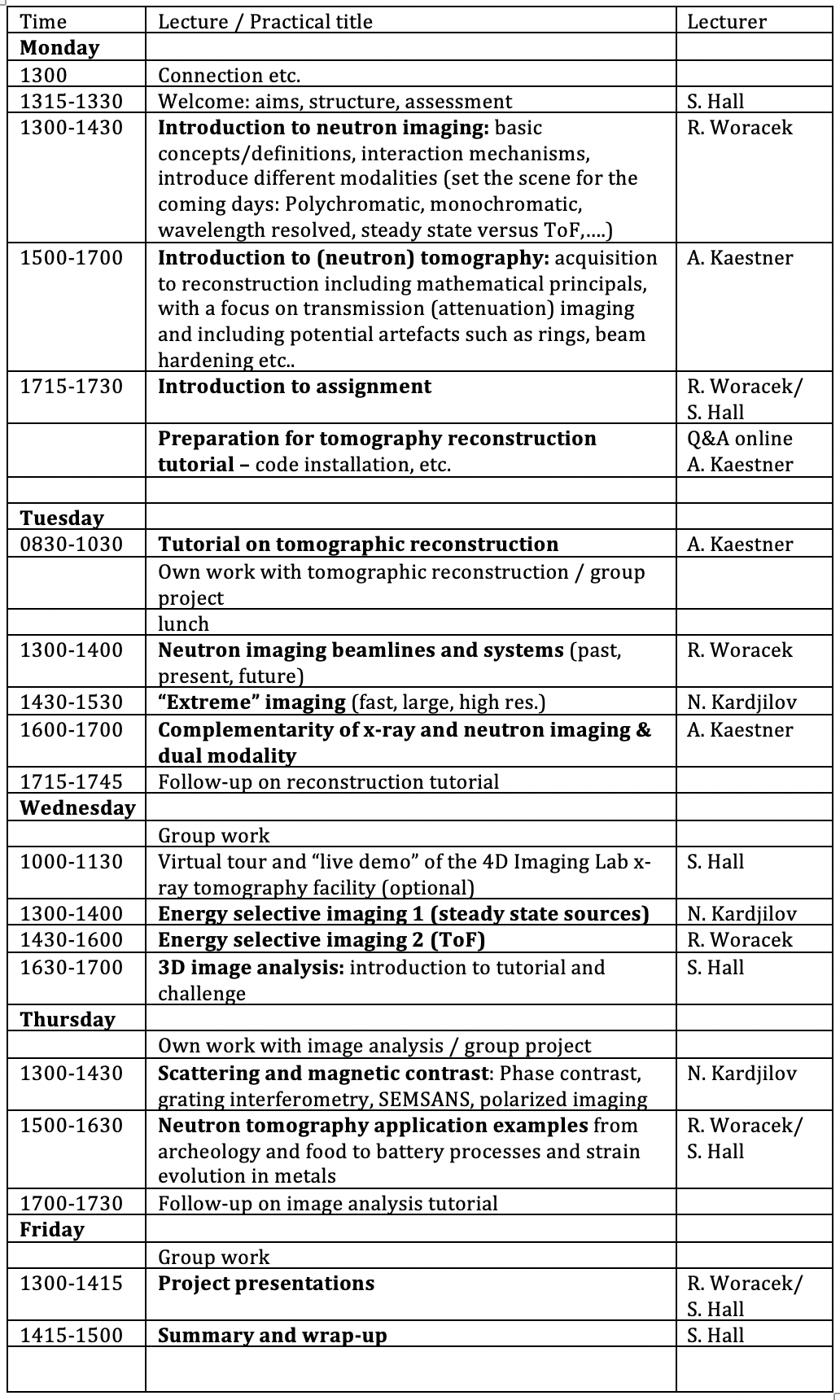Overview
This doctoral-level course will introduce to neutron imaging from radiography and tomography to advanced approaches such as scattering-contrast, energy-selective and polarised neutron imaging. Each modality will be described from its theoretical background through to the experimental practicalities, data analysis and real examples.
The course will involve a combination of lectures and hands-on (computer-based) exercises with experts in the field from leading neutron imaging facilities. Practical aspects relating to planning and preparing neutron imaging experiments will also be discussed. In addition, there will be opportunities to discuss with experts in the field and fellow researchers.
Due to on-going covid-19 restrictions the course will be held on-line and the content adapted to best function in this format. Lectures will be mostly in the afternoons with the morning set aside for practicals and group work.
The objectives of the course are to develop awareness and understanding of different neutron imaging methods and their possible applications in different areas of research. Students should thus be able to make more effective use of neutron imaging in research by identification of the best methods, understanding the strengths of different methods/facilities and understanding the importance and key aspects of data analysis. Students will also gain insight into the future possibilities in neutron imaging, e.g., at ESS.
The course is open to doctoral students, postdocs and researchers. Preference will be given to doctoral students, and in particular those in the SWEDNESS program. Acceptance to the course will be given by the end of April. Students wishing to gain course credits towards their PhD degree will be expected to submit follow-up course work that, together with the lectures, will amount to 3 ECTS. There is no charge to attend the course, which is organised in collaboration between SWEDNESS (www.swedness.se) and LINXS (www.linxs.se).
Application deadline is May 1.
Schedule
Assessment
1. Mock imaging project proposal based on a given material challenge where the facility and beamline choice is free, but should be justified (i.e, the students should investigate the different beamlines at different facilities and explain why one beamline is chosen over another). The imaging configuration should also be given (imaging mode, beamline/imaging parameters, e.g., L/D, resolution). This should be developed in groups during the week and presented to the whole class at the end of the week before being written up and submitted as a group work. Groups will be set-up that combine students with different research interests/backgrounds and home institutions.
2. Image analysis challenge. The students should first follow a tutorial that guides them through some aspects of image visualization, filtering and segmentation in Fiji / Matlab. Based on this, the students will tackle an example data set to segment phases then visualize and quantify the output. This should be presented as a report.
Lecturers
- Robin Woracek (ESS)
- Anders Kaestner (PSI)
- Nikolay Kardjilov (HZB)
- Stephen Hall (U. Lund)
Comments
All lectures will be “live” on-line and adapted to this format.
Lectures will also be recorded with the aim to make the lectures public on the LINXS website.
Students will be expected to have a laptop computer sufficient for the image analysis and reconstruction practical parts; these practicals will also be adapted to be possible on “standard” laptops.
Part of the course will involve a hands-on exercise in tomographic data reconstruction using the program muhrec from Anders Kaestner at PSI: https://github.com/neutronimaging/imagingsuite/wiki/User-manuals-MuhRec-FirstRecon (and test data: http://dx.doi.org/10.17632/g5snr785xy.2)
The students should also have access to matlab
During our events we sometimes take photographs and short film clips to profile our activities. Please let us know if you don’t want to be in any photos/films before we start the event. Some of the talks might be recorded to be used for educational purposes in the LINXS website.
By registering to our events you give your permission to LINXS, according to the General Data Protection Regulation (GDPR), to register your name and e-mail address to be used for the sole purpose of distributing newsletters and communications on LINXS activities.


